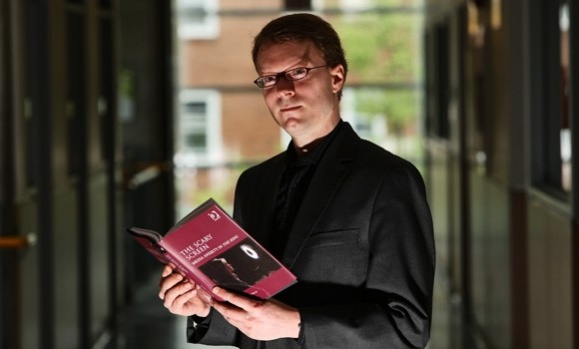When The Ring came out in 2002, most people watched it once, then allowed it to fade from mind so their heart rates could return to normal. Not so Dal professor Anthony Enns.
His fascination with The Ring not only lasted, but recently culminated in his article âThe Horror of Media: Technology and Spirituality in the Ringu films,â published in collection The Scary Screen (ed. Kristen Lacefield, London: Ashgate Publishing, 2010).
âMy essay is on the Japanese films⊠and the history of Japanese parapsychology,â explains Dr. Enns, assistant professor of English. âMy dissertation was on spiritualism and psychical research⊠I actually knew about the history before I saw the films.â
Scary sources
When he first viewed the Japanese film The Ring is based upon, Ringu (Hideo Nakata, 1998) Dr. Enns was struck by its similarities to the story of historical Japanese parapsychological researcher Tomokichi Fukurai. âAs soon as I saw the Japanese films, I knew that they were borrowing from this book,â says Dr. Enns. âThis (the film) is based loosely on an actual press conference that Fukurai held in 1910.â
Many North American viewers missed the homage by watching only director Gore Verbinskiâs take: âAll of this history is omitted from the American remake⊠I think thatâs simply because international viewers would not recognize the references to Fukurai.â
Not only does Dr. Enns view Ringu as being quietly inspired by Fukuraiâs work, he sees Fukurai himself as subtly resisting the 20th century domination of Western modernization over local Japanese traditions.
âPsychology, as a discipline, was imported from the West⊠Fukurai was trying to counteract this tendency. He wasnât embracing the Western version of psychology that he was âsupposed to,ââ but instead, âan older tradition that didnât fit into Western notions of rationality.â Fukaraiâs work in the occult brought him into association with Japanese mediums such as Chizuko Mifune and Sadako Takahashi, women who claimed talents of clairvoyance and nengraphy (the ability to influence photographs). Fukuraiâs publication of his theories met with widespread ridicule. âIn the film,â says Dr. Enns, âThey incorporate the psychicâs suicide, nengraphy⊠although the shift is from photography onto videotapes.â
While he enjoyed Ringu, Enns doesnât think it helped Fukuraiâs image. âI do think thereâs something very conservative, ultimately, about the narrative. Theyâre betraying what Fukurai was trying to do⊠suddenly psychical research is something to be afraid of, itâs something to be feared,â he explains, though he takes care to add âbut I think theyâre great as films.â The Japanese film was based on Koji Suzukiâs novel Ringu, and according to Dr. Enns, print narratives tend to take a hard tack on the occult possibilities inherent in new technologies. âNew technologies always have urban legends: ghost photographs, phonograph recordings of voices of the dead⊠the history is fascinating⊠these narratives are incorporated into print narratives through the mode of the gothic. Print narratives are always trying to remind us that other media are dangerous.â
Fascinating reading
Itâs also no coincidence that the terrifying evil at the heart of the different versions of Ringu is always female: early spiritualism had feminist undertones. âFor a lot of women in the mid-19th century, being a medium was the only way to get work.â Women, after all, were the telephone operators, and a âspiritual medium was a switchboard for the dead.â
Given Dr. Ennsâ intense and sustained research on otherworldly interactions, does he care to weigh in? Do ghosts, mediums, clairvoyants exist? Were Fukurai and his mediums spurned visionaries, or mere tricksters?
âI donât know, and I donât think it matters,â says Dr. Enns. âItâs very possible that the mediums were conning him⊠I donât think that he himself had a motive for trying to trick people.â And why societyâs eternal fascination with the supernatural and horrific, from Fukuraiâs era to our own? Are we just a morbid bunch? Dr. Enns gives us a little more credit. âI donât believe in spirits, but with these new technologies⊠we are surrounded by the dead all the time in a way that people from the 18th century wouldnât have experienced.â
If youâve seen Ringu, then, Dr. Ennsâ article will prove fascinating reading material, and, if you havenât, it comes recommended by a reliable source. Throw some popcorn in the microwave, and donât forget to leave the lights on.

